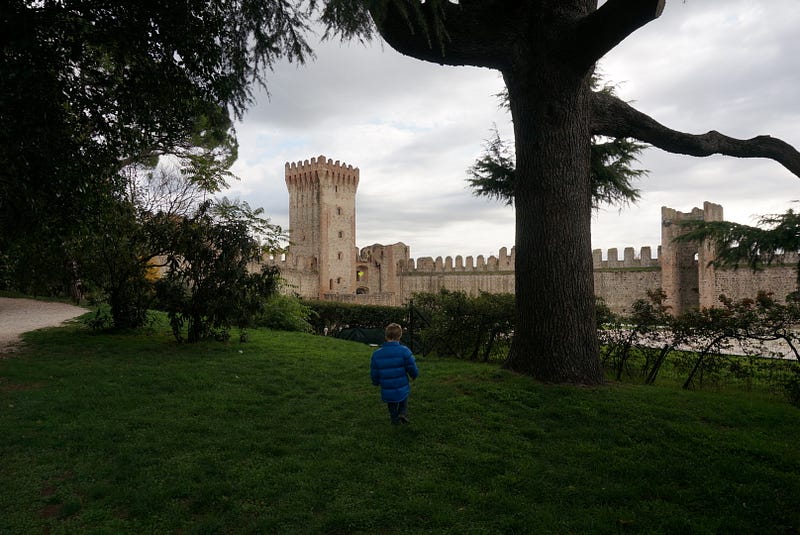It is around 11pm, and I am inching towards a project deadline for a client.
The home internet connection won’t work, and I am over trying to fix it. I revert to my mobile internet connection, which is patchy where we are in the Euganean Hills (seems to be influenced by weather, the tides, and lunar patterns), and fails to work properly. I try my wife’s mobile connection, which thankfully works. I get the project finished, and submitted over an internet connection that is sometimes slower than what I had at home in 1998.
And this little story is perfectly representative of life in rural Italy. Sometimes the electricity works, and other times does not. The sounds of goats interrupt my calls. Almost everything is chaotic, and over-engineered — even getting a prepaid mobile number here was a drama.
It was over a year ago that my wife and I decided to relocate to Italy for three months with our very energetic three year old in tow. I had just handed over my recruitment company to new owners, and had started to work full time on what had been a side business for many years in business automation.
With mix of clients in Australia, North America, the UK, and Europe, Italy was a natural choice in terms of timezone, and ease of travel to nearby countries.
Because I specialize in business automation and integration, in planning this extended trip I was conscious of the fact that I had to practice what I preach. It shows how automation helped me big time.
My clients don’t really care where I am in the world, but they do care about their projects being done, and being able to talk to me when they need to.
Even though I develop some fairly complex systems for other companies, my own processes are fairly simple. My view is that system at its heart ought to have as few steps as possible. This reduces user friction, increases usability, and costs less.
Many people are surprised to learn that I don’t use a CRM at all, and I do not have a receptionist or admin person (though I do have team members who have their own particular specialties, and help me with a lot of tasks).
Because I can’t always share details on the client work I do, this is an opportunity to share how I operate my own business. So, this is what I did to automate things as much as possible during my time in Europe:
Onboarding New Clients
My website is set up so that there are two very specific pathways new clients can follow. The first path is they complete a quick natural language form to tell me what they need and then book a time using my online scheduler (which syncs up with my Google calendar). This deals with the time difference. This just goes to show how automation helped me again.
The other option is using online chat, which asks the same questions as the website form. It also has some basic AI functionality, so the user can ask the bot questions if we are not around. I’m working on building this function over the next few months.
Once the client books a time, we talk, and when the project goes ahead they complete an online agreement, enter their payment details, and their project is scheduled in. A new Slack channel and a Trello board are initiated for the project — and you got it, automation helped one more time.
Managing Projects & Clients
Each project has a Trello board with ‘To Do’, ‘Doing’, and ‘Done’ lists. Each project task is moved between those lists. An integration sends a message to the client in Slack to update them on each piece of progress, or query. The client has my meeting booking link, and can book a time to talk that suits them whenever they want.
The bulk of my clients are billed automatically each week using Stripe, so there is nothing additional to make sure things are paid on time.
Team Members
I have team members across the world, and each of them has their own Trello board. Tasks from projects (or internal work) are placed onto their board, with due dates, so they can complete things. The actual work allocation is a manual process that I do at the start of each project. I can see at a glance where things are up to. There’s no need for team meetings or pointless discussions.
Communication
With clients and team members, I use Slack. That way they can see when I am online (or not), and I don’t wake up to a pile of emails. I tend to use Zoom for video calls, or sometimes Skype if I need to record the call.
I have Twilio phone numbers set up for Australia and the USA, which automatically divert to my Australian mobile. That way, clients don’t need to worry about international call costs, and by routing the numbers appropriately, I can avoid global roaming fees.
How Does It All Come Together?
So, with all of this in place, all that’s left is to do the actual work. I am passionate about the development work I do, and love every moment of it. The automation enables me to make that work portable, and to focus on the core service delivery rather than the bits and pieces that support the business. Again, automation helped me.
All my work has been done between day trips to castles and medieval towns, meals of pasta and wild boar, train trips and flights, podcast recordings, and toddler tantrums.

Automation helped me as well when things in my local environment fell apart (e.g. electricity failure, sick child, escaped goats), and the past three months have been an amazing proof of concept for business automation.
Does everything go to plan? No. I have forgotten to change my calendar settings when I cross time zones, and had to apologize to a client for missing a meeting. It is theoretically possible for an app I use to have down time, but this hasn’t happened yet. And of course, there is the internet — the terribly slow, sketchy internet (which, by the way, is much faster in city areas here).

On the balance of it, I am not sure I could have done this trip without the systems I have in place to stay ahead of time differences, reduce the need for human intervention in repetitive tasks, and to have every bit of information I need at hand, no matter where I am.
Aside from the mind-numbing bureaucracy, complete shambles of a communication structure, and the apparent inability of people to form an orderly line here, Italy has been a life-affirming experience in so many ways.
My wife has had a much earned break from her busy legal practice, and my toddler son has absorbed a great deal more Italian language than I have.
People work extraordinarily hard in Italy, and spend a lot of time with their families around big kitchen tables. They are enthusiastic about their jobs, and take immense pride in their work. The open their houses generously and graciously.
I am grateful for both the physical and personal journey of this trip, and for the hard-working technology that has been the foundation of what I do every day. If you were ever considering relocating temporarily or permanently, there is possibly no better time to do it.
Want to learn more about automation? You can find me at Agility Automation.





